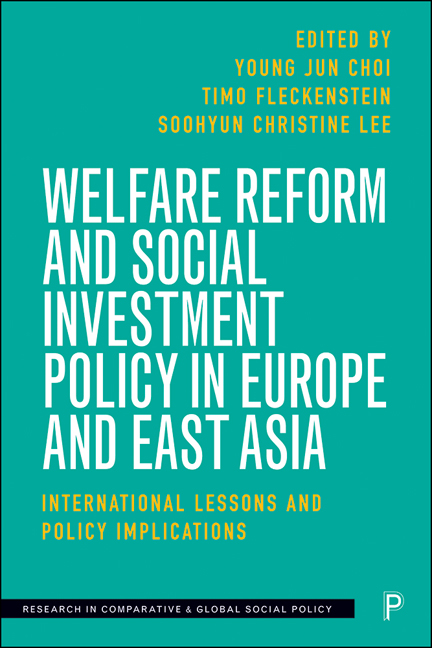Book contents
- Frontmatter
- Contents
- List of figures and tables
- Notes on contributors
- Acknowledgements
- Preface from the series editors
- 1 Introduction: social investments and welfare reform in Europe and East Asia
- 2 Work–family policy expansion and the idea of social investment: the cases of Germany, England, South Korea and Japan
- 3 Private education in South Korea: lessons for the West from past mistakes?
- 4 How do family background and shadow education affect academic performance and labour market outcomes in South Korea? Reasons for redistributive social investment
- 5 Employability, higher education and the knowledge economy
- 6 Does social investment make the labour market ‘flow’? Family policies and institutional complementarities in Italy, Spain, Japan and South Korea
- 7 The social investment approach and gender division of housework across East Asia and Europe
- 8 Employment outcomes of social investment in latecomer countries
- 9 Estimation of the human capital depreciation rate: an international comparison and policy implications in South Korea
- 10 Changing patterns of grandparenting and their implications for active ageing in England and South Korea
- 11 The governance of social investment policies in comparative perspective: long-term care in England and South Korea
- 12 Towards greater social investments and equality in Europe and East Asia: policies and politics
- Index
4 - How do family background and shadow education affect academic performance and labour market outcomes in South Korea? Reasons for redistributive social investment
Published online by Cambridge University Press: 21 December 2021
- Frontmatter
- Contents
- List of figures and tables
- Notes on contributors
- Acknowledgements
- Preface from the series editors
- 1 Introduction: social investments and welfare reform in Europe and East Asia
- 2 Work–family policy expansion and the idea of social investment: the cases of Germany, England, South Korea and Japan
- 3 Private education in South Korea: lessons for the West from past mistakes?
- 4 How do family background and shadow education affect academic performance and labour market outcomes in South Korea? Reasons for redistributive social investment
- 5 Employability, higher education and the knowledge economy
- 6 Does social investment make the labour market ‘flow’? Family policies and institutional complementarities in Italy, Spain, Japan and South Korea
- 7 The social investment approach and gender division of housework across East Asia and Europe
- 8 Employment outcomes of social investment in latecomer countries
- 9 Estimation of the human capital depreciation rate: an international comparison and policy implications in South Korea
- 10 Changing patterns of grandparenting and their implications for active ageing in England and South Korea
- 11 The governance of social investment policies in comparative perspective: long-term care in England and South Korea
- 12 Towards greater social investments and equality in Europe and East Asia: policies and politics
- Index
Summary
Introduction
Researchers argue that social investment policies contribute not only to equal opportunity and human capital development, but also to the sustainability of welfare states. In that respect, these policies are regarded as the new vanguard of the welfare state (Morel et al, 2012). Yet, in the west, many criticise the role of social investment policies, as they tend to place too much focus on the (re)commodification of labour and are unable to cope with increasing inequality. In fact, scholars suspect social investment policies create a Matthew effect (Bonoli et al, 2017). However, many commentators note that East Asian welfare regimes do not need social investment policies to enhance human capital, as these countries are well-known for highly commodified labour and high rankings in the Programme for International Student Assessment (PISA).
However, these commentators seem to largely neglect the social outcomes of education policies in East Asian countries. Behind the scenes of their remarkable educational achievements, these countries seem to suffer from decreasing social mobility. For example, in South Korea (hereafter Korea), once praised for its active upward social mobility, the media has frequently referred to the country's increasing social inequality and reduced social mobility using the terms ‘gold spoon’ and ‘dirt spoon’. Unlike decreasing social mobility, overall education expenditure in Korea is 8 per cent of GDP, and public expenditure has increased from 3 per cent in 2000 to more than 5 per cent in 2015 (World Bank, 2018). This could mean that the education policy and expenditure has not been able to reverse the labour market dualisation and has failed to secure an equitable outcome. Therefore, it is still important to look at education policy from the perspective of social investment.
This chapter aims to explore the role of education and social investment, with special attention on the effects of shadow education on social mobility in Korea. There has been much social and political discussion about social mobility, but few empirical studies have been conducted. This study analyses how family background and shadow education influence educational attainment and, subsequently, how educational attainment affects incomes, using data from the Korea Education and Employment Panel (KEEP).
- Type
- Chapter
- Information
- Welfare Reform and Social Investment PolicyInternational Lessons and Policy Implications, pp. 85 - 106Publisher: Bristol University PressPrint publication year: 2021

